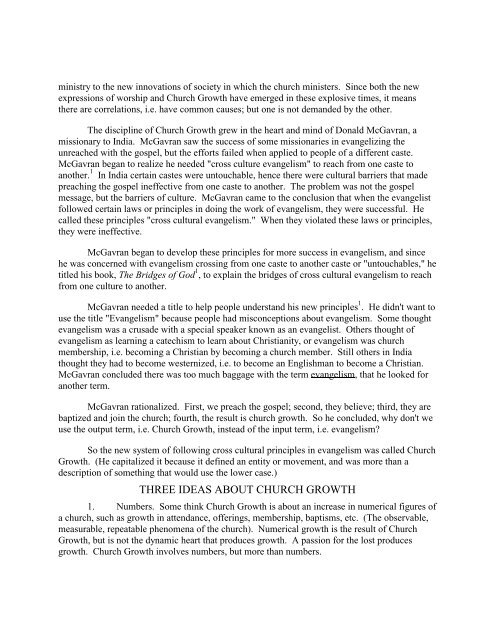PUTTING AN END TO WORSHIP WARS - Elmer Towns
PUTTING AN END TO WORSHIP WARS - Elmer Towns
PUTTING AN END TO WORSHIP WARS - Elmer Towns
- TAGS
- worship
- elmer
- towns
- elmertowns.com
Create successful ePaper yourself
Turn your PDF publications into a flip-book with our unique Google optimized e-Paper software.
ministry to the new innovations of society in which the church ministers. Since both the new<br />
expressions of worship and Church Growth have emerged in these explosive times, it means<br />
there are correlations, i.e. have common causes; but one is not demanded by the other.<br />
The discipline of Church Growth grew in the heart and mind of Donald McGavran, a<br />
missionary to India. McGavran saw the success of some missionaries in evangelizing the<br />
unreached with the gospel, but the efforts failed when applied to people of a different caste.<br />
McGavran began to realize he needed "cross culture evangelism" to reach from one caste to<br />
another. 1 In India certain castes were untouchable, hence there were cultural barriers that made<br />
preaching the gospel ineffective from one caste to another. The problem was not the gospel<br />
message, but the barriers of culture. McGavran came to the conclusion that when the evangelist<br />
followed certain laws or principles in doing the work of evangelism, they were successful. He<br />
called these principles "cross cultural evangelism." When they violated these laws or principles,<br />
they were ineffective.<br />
McGavran began to develop these principles for more success in evangelism, and since<br />
he was concerned with evangelism crossing from one caste to another caste or "untouchables," he<br />
titled his book, The Bridges of God 1 , to explain the bridges of cross cultural evangelism to reach<br />
from one culture to another.<br />
McGavran needed a title to help people understand his new principles 1 . He didn't want to<br />
use the title "Evangelism" because people had misconceptions about evangelism. Some thought<br />
evangelism was a crusade with a special speaker known as an evangelist. Others thought of<br />
evangelism as learning a catechism to learn about Christianity, or evangelism was church<br />
membership, i.e. becoming a Christian by becoming a church member. Still others in India<br />
thought they had to become westernized, i.e. to become an Englishman to become a Christian.<br />
McGavran concluded there was too much baggage with the term evangelism, that he looked for<br />
another term.<br />
McGavran rationalized. First, we preach the gospel; second, they believe; third, they are<br />
baptized and join the church; fourth, the result is church growth. So he concluded, why don't we<br />
use the output term, i.e. Church Growth, instead of the input term, i.e. evangelism?<br />
So the new system of following cross cultural principles in evangelism was called Church<br />
Growth. (He capitalized it because it defined an entity or movement, and was more than a<br />
description of something that would use the lower case.)<br />
THREE IDEAS ABOUT CHURCH GROWTH<br />
1. Numbers. Some think Church Growth is about an increase in numerical figures of<br />
a church, such as growth in attendance, offerings, membership, baptisms, etc. (The observable,<br />
measurable, repeatable phenomena of the church). Numerical growth is the result of Church<br />
Growth, but is not the dynamic heart that produces growth. A passion for the lost produces<br />
growth. Church Growth involves numbers, but more than numbers.
















